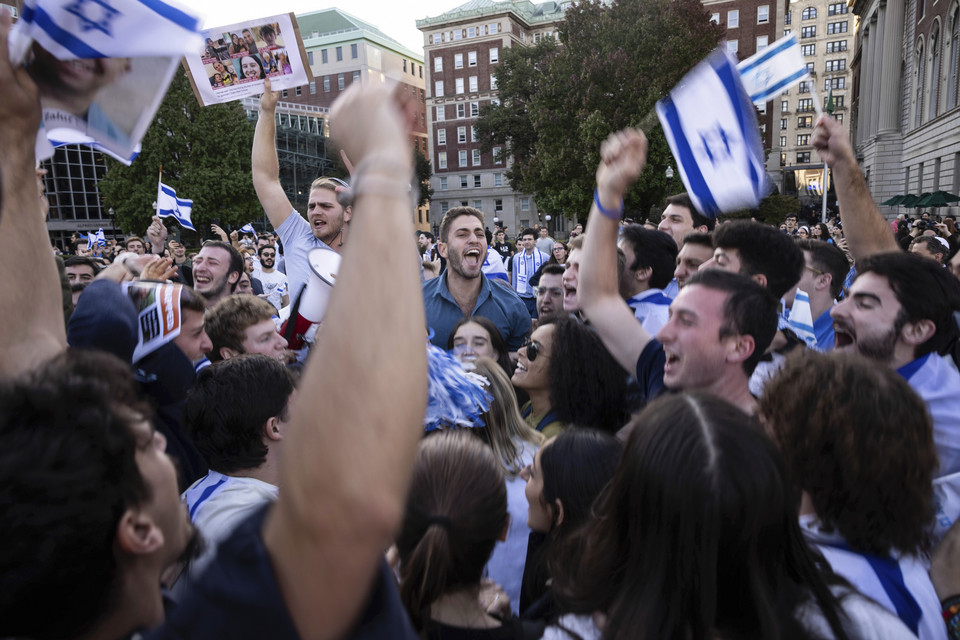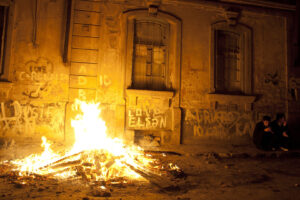NEW YORK — The war in the Middle East is destabilizing the progressive wing of the Democratic Party in New York, where tensions are spilling into the streets with daily rallies and protests over the Israeli-Hamas conflict.
The strife could have vast implications for some of the biggest electoral offices in the nation.
In the past, left-leaning candidates in the deep-blue state have been able to stitch together a coalition of the far left, progressives and traditional liberals to win citywide office and mount challenges to moderate Democrats in mayoral and gubernatorial races.
But now, in the state with the biggest Jewish population outside Israel, disparate groups are splintering over their position on Hamas’ surprise invasion and the Israeli government’s response. And that stands to weaken support within the party’s left wing — and by extension strengthen the position of moderate Democrats.
“This has been an earthquake,” said one New York City Democratic official, who like numerous lawmakers was granted anonymity to discuss the political implications of the mounting conflict. “And a chasm has opened up between the left and the far left.”
Horrifying images from the front lines — including the aftermath of a Gaza hospital strike — have stoked deeply held convictions around Israel and the Palestinian territories that have been increasingly divisive in Democratic circles, particularly in New York. And nowhere has that tension been more acute than in the party’s progressive wing.
At the outlands of the left’s coalition in New York, the Democratic Socialists of America have long been defenders of Palestinians and backers of the boycott, divest and sanctions movement against Israel.
Bookending the alliance on the other side are significant numbers of progressives or more traditional liberals — many of them Jewish — who largely oppose BDS and support Israel (though not necessarily its leadership), and have expressed a feeling of betrayal by leftists they once considered political bedfellows.
In the past, several candidates have been able to draw upon a brackish mixture of these constituencies by focusing on shared ideals — like higher taxes for the wealthy or stronger protections for renters — that overlooked the gulf on Israeli-Palestinian issues.
But the world has changed significantly in the last few weeks.
“The debate isn’t new, but as long as this conflict is in the headlines it becomes a sharper knife’s edge,” said Gabe Tobias, a progressive political strategist in the city. “I think you saw that with the spectrum of left elected officials who were clearly putting a lot of thought into their reactions — they were not tweeting from the hip.”

Granted, even with varying versions of this coalition intact, the left has struggled to gain electoral ground in New York — losing out to moderates like New York City Mayor Eric Adams, Gov. Kathy Hochul and former Gov. Andrew Cuomo.
But if war in the Middle East were to split it altogether, the rift would sap the movement’s forward momentum and clear the way for more moderate lawmakers to claim some of the most consequential elected offices in the country, some party officials said.
Historically, New York politicians have been ardent supporters of Israel. In fact, they were some of the first.
In 1948 — the year Israel declared statehood amid vehement opposition in the Middle East — Gov. Thomas Dewey was locked in a pitched battle for the White House with incumbent President Harry Truman.
Dewey, a Republican, came out strongly in support of Israeli statehood — a key issue for Jewish voters — which helped press Truman into his decision of immediately recognizing the newly declared nation ahead of Election Day.
Since then, a long list of governors and mayors have made regular pilgrimages there. Cuomo went three times, and his successor Hochul visited this month for the first time, a trip that included a meeting with Israeli Prime Minister Benjamin Netanyahu.
Today, New York’s Jewish population is about 1.6 million — or about 21 percent of all Jews in the nation, according to a Brandeis University study in 2020.
Within the Democratic Party, however, support for Israel has been on the decline over the last decade, driven by younger members to the left who have been more sympathetic to Palestinians.
That divide is now being amplified several times over as hostages remain in Gaza, new revelations emerge about the brutality of the initial attack and Israel prepares for a ground invasion amid mounting Palestinian casualties and wholesale destruction from rocket fire in parts of the occupied territory.
In response, elected officials on the left have staked out different positions as emotions run high.
On Oct. 20, for example, a number of elected officials endorsed by the DSA — including state Assembly members Zohran Mamdani and Phara Souffrant Forrest — attended a pro-Palestinian rally that culminated in a sit-in outside the home of Sen. Chuck Schumer, the most prominent Jewish elected official in the country.
The elected officials, who were joined by organizations on the left like Jewish Voice for Peace, called for a ceasefire between Hamas and Israel.
Congress members Jerry Nadler (D-N.Y.) and Dan Goldman (D-N.Y.) — who represent large Jewish communities who tend to vote for liberal and progressive candidates in Manhattan and Brooklyn — have distinguished themselves from the far left without offering the sort of full-throated support for Israeli military action pushed by moderate lawmakers like Adams or Hochul.
Three days after the Brooklyn rally, they were among hundreds of their colleagues to sign a letter in support of President Joe Biden’s position on the conflict, which has included strong backing for Israel while also calling for humanitarian aid in Gaza and limiting civilian casualties.
“We stand with you in supporting Israel and are ready to provide whatever assistance the state and people of Israel need to defend themselves and to ensure that hostages return home and those who perpetuated these crimes against humanity are held accountable,” the letter read.
On Thursday, the duo expressed support for pauses in the fighting to allow for aid — but notably did not use the word “ceasefire.”

In the past, candidates have been able to pull votes from both ends of this spectrum. Take the example of Brad Lander.
To successfully pull off his 2021 Democratic primary win for New York City comptroller — the second most prominent elected position after mayor — he drew upon several elements of the left: DSA lawmakers who endorsed his run, the Working Families Party and high-turnout neighborhoods that are home to concentrations of Jewish voters like Manhattan’s Upper West Side and brownstone Brooklyn.
Former Comptroller Scott Stringer consulted a similar playbook during 2021’s mayoral election. And Jumaane Williams, the city’s public advocate, and Cynthia Nixon, the actor and progressive activist, both attempted to corral similar factions in their runs for New York governor (but failed to come anywhere near beating their moderate competitors).
Such an alliance now would be more difficult to pull off, as an endorsement from one part of the coalition could prove disqualifying to another.
“Your friends can get you in trouble in politics,” Jon Paul Lupo, a Democratic consultant who has worked with progressive candidates, said in an interview. “And that could create problems for those on the left who have ambitions to win citywide.”
More moderate lawmakers, meanwhile, have echoed many GOP lawmakers in hammering the left’s anti-Israel stance — zeroing in on a rally initially supported by DSA, via a social media post, that was held a day after the war broke out Oct. 7.
The blowback to the gathering was forceful and immediate, with nearly every elected official in the city weighing in to condemn its antisemitic messaging, with some suggesting it will become a lasting issue for the far left — and anyone courting their support down the road.
“The DSA has made itself radioactive in New York politics,” Rep. Ritchie Torres (D-N.Y.), perhaps the most vocal opponent of DSA, said in an interview. “And those associating with the DSA do so at their own political peril.”
Adams, who has long been at odds with the left, took several opportunities in the days after the rally to similarly bash the DSA — even after their role in the Oct. 8 rally became less clear-cut.
“It really, I think, was despicable, while our Jewish brothers and sisters were mourning the immediate aftermath of the slaughter that we saw in Israel that you had the DSA and others carrying swastikas and calling for the extermination of Jewish people,” he said recently on MSNBC.
Those on the left, however, noted that nobody can know how public opinion will evolve, and how that evolution might impact legislative or political campaigns.
“To me, it is too early to predict if this will have an impact on left-liberal coalition building for other policy issues or for electoral campaigns,” state Sen. Julia Salazar, a DSA member, said in a statement to POLITICO. “But for the left’s immediate task of trying to stop the violence and protect civilians and hostage via a cease-fire and effective diplomacy, we need to be trying to expand the coalition demanding it.”
Others are hoping to push back on any attempt from the political center — or beyond — to divide their ranks.
“Moderates and Republicans will look to exploit DSA’s position and stance on Israel as a way to alienate and split communities — I don’t know if it will work,” progressive strategist Camille Rivera told POLITICO.
“But what I do know is that it’s too tense right now for anyone to think rationally on both sides. I think we need to see how this all plays out politically, and my gut tells me that New Yorkers aren’t as polarized as social media makes us out to be.”
Source : POLITICO










